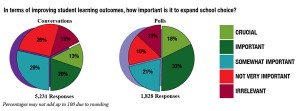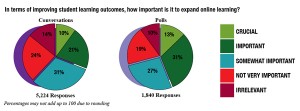Online ed expansion, school choice plan murky in 2013
A proposal to revise the state’s School Aid Act to allow state funding to follow students to where they take individual classes will not be part of Gov. Rick Snyder’s budget proposal next month, but could make its way into legislative discussions over that budget.
None around Lansing were willing to commit to any course of action until the final report is released.
Attorney Richard McLellan, author of the report being funded by the Oxford Foundation, has said the final report should be out by the end of the month and should be little different from the draft report released in November. The draft report included a variety of proposals to enhance “school choice” for parents.
Expansion of choice and online learning were not at the top of the list of school reform items backed by the largest majorities of citizens contacted by the nonprofit, nonpartisan Center for Michigan* for its new education report, “The Public’s Agenda for Public Education.”
That report, summarizing the largest public opinion focus on K-12 education in Michigan, found interest in school choice and online learning, but much more support for investments in early childhood education and improved teacher preparation and greater accountability for educators.
The Oxford proposal would allow students and parents to dictate where their school aid money goes (though not avoiding the state’s ban on funds to private schools). They could then take all of their courses at one school or spread their coursework across several schools, including colleges and universities, with their state aid going to those schools based on the proportion of the student’s time spent at each.
Snyder is not abandoning the plan, but is giving it more time for discussion, spokesperson Kurt Weiss said.
“The governor is looking forward to receiving the School Aid Report and sees it as a starting point for a good discussion and dialogue, discussion that will continue into April with the planned Education Summit and beyond,” Weiss said. “The governor knows the report will give us good information to get the ball rolling. So, this is a start to a longer process of discussion that won’t be completed prior to completion of the 2014 budget process.”
Legislators expect action on school funding
Sen. Phil Pavlov, R-St. Clair and chairman of the Senate Education Committee, said the move to “performance-based funding” is a national trend and the ideas in the draft report could make Michigan a leader in the area.
Sen. Howard Walker, R-Traverse City and chairman of the Senate Appropriations School Aid Subcommittee, said he expected some of the elements from the report would be included in his chamber’s budget for K-12 schools.
“The changes are designed to provide the best learning opportunities for each student,” he said.
“I think that we’re ready to start rolling out changes on the School Aid Act, moving in that direction, he said. “My anticipation is that we’ll be working on these changes during the budget process. Because it’s a process, it’s hard to predict what the outcome will be.”
Pavlov acknowledged the governor’s hesitancy to include the ideas from the report into his upcoming budget presentation, but said some of that is giving people time to digest the report before using it.
But the Legislature would be free to adopt ideas from the report is it moves the budget forward, he said. “I’m not so sure that we can’t implement some of the concepts in there,” he said.
The ideas form the draft report, at least, flow from what the state has already been doing for many years.
“We’ve instituted a lot of reforms and a lot of choices for parents and students,” Pavlov said. “We really have to modernize how we fund it.”
How the House will handle the issue is unclear. Committee assignments are not final, including for Education Committee chair. Rep. Lisa Posthumus Lyons, R-Alto, was the Education Committee chair for the end of the 2011-12 term after the previous chair, former Rep. Paul Scott, was recalled.
Lyons would like to lead a different committee this term, but education conservatives have urged her to stay.
Nonprofit finds mixed views on choice, online
While expansion of choice and online learning did not receive the largest amount of support in the CFM public engagement campaign, citizens did express support, but in some conflicting ways.
For example, in the two scientific opinion polls by CFM, 51 percent said more school choice was “crucial” or “important,” but in the townhall meetings conducted by CFM, only 33 percent said the same about choice.
Expansion of online learning, such as that envisioned in the Oxford documents, also received noticeably greater support in the CFM polling than in the views expressed at townhall sessions.
"Yes, there’s some clear difference between the poll and meeting results on the choice question. That’s why we’ve stated in the report that the public’s views on choice are more mixed than on some other options to improve student learning," said John Bebow, president of CFM.
"There is always going to be some statistical variance in public engagement work. There are strengths and weaknesses to both forms of public engagement we use. Polls are more statistically representative, but do not allow for in-depth and thoughtful discussion among citizens. Community conversations allow for plenty of citizen dialogue but participants are self-selected," Bebow added. "That’s why this report carefully emphasizes key education reform approaches that received consistent two-thirds public support in both our polls and community conversations. Those are issues with clear and consistent public mandate."
The proposals in the Oxford report would be an incentive for students to finish high school early and begin taking college classes while the state would pay for them. “As expensive as a college education is, why can’t we be giving them a head start on it?” Pavlov said.
One hitch that has been raised by Superintendent of Public Instruction Mike Flanagan is federal accountability programs. The federal adequate yearly progress standard is based on the assumption that a student is in a particular building, or at least a particular district, for most of his or her education in a given year. That allows any gains, or losses, in that student’s achievement to be attributed to that school or district.
Opening choice to the extent envisioned by the report would make allocating those accountability measures substantially more difficult, Flanagan has said.
*The Center for Michigan is the parent organization of Bridge Magazine.
Chris Klaver is a reporter for the Gongwer News Service in Lansing, where he has worked for 20 years. Prior to joining Gongwer, the Michigan State University grad worked for the Grand Traverse Business Journal.
Michigan Education Watch
Michigan Education Watch is made possible by generous financial support from:
Subscribe to Michigan Education Watch
See what new members are saying about why they donated to Bridge Michigan:
- “In order for this information to be accurate and unbiased it must be underwritten by its readers, not by special interests.” - Larry S.
- “Not many other media sources report on the topics Bridge does.” - Susan B.
- “Your journalism is outstanding and rare these days.” - Mark S.
If you want to ensure the future of nonpartisan, nonprofit Michigan journalism, please become a member today. You, too, will be asked why you donated and maybe we'll feature your quote next time!


 Public views on school choice expansion. CLICK TO ENLARGE.
Public views on school choice expansion. CLICK TO ENLARGE. Public views on online learning. CLICK TO ENLARGE.
Public views on online learning. CLICK TO ENLARGE.
